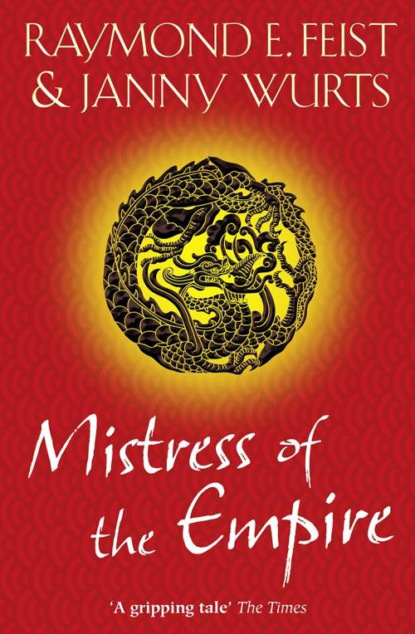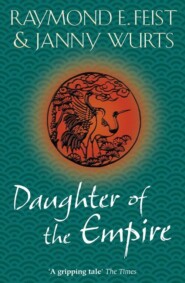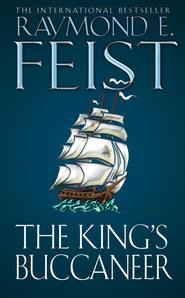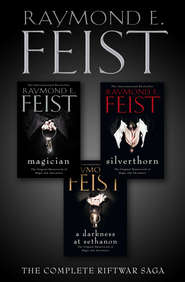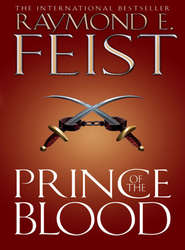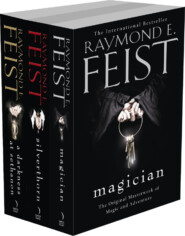По всем вопросам обращайтесь на: info@litportal.ru
(©) 2003-2025.
✖
Mistress of the Empire
Автор
Год написания книги
2018
Настройки чтения
Размер шрифта
Высота строк
Поля
‘Ah.’ Chumaka had the ill grace to look delighted as he removed his captured minor player. With his left hand still occupied with papers, he immediately advanced his priest.
The Anasati Lord chewed his lip, vexed; why had his First Adviser done that? Enmeshed in an attempt to fathom the logic behind the move, Jiro barely noticed the messenger who hurried into the chamber.
The arrival bowed to his master. Immediately upon receiving the languid wave that allowed him leave to rise, he passed the sealed packet he carried to Chumaka.
‘Your permission, master?’ Chumaka murmured.
‘The correspondence is coded, is it not?’ Jiro said, not wanting the interruption as he pondered his next move. His hand lingered between pieces, while Chumaka cleared his throat. Jiro took this for affirmation. ‘I thought so,’ he said. ‘Open your dispatches, then. And may the news in them for once dull your concentration for the game.’
Chumaka gave a short bark of laughter. ‘The more scurrilous the gossip, the keener I will play.’ He followed Jiro’s indecision with an amusement that almost, but not quite, approached contempt. Then he flipped over the pouch and used the one thumbnail he left unbitten for the purpose to slit the tie.
As he thumbed through the papers inside, his brows arched. ‘This is most unexpected.’
The Lord of the Anasati’s hand hung in space. He looked up, intrigued by the novelty of his First Adviser’s surprise. ‘What?’
Servant to two generations of Ruling Lords, Chumaka was rarely caught out. He regarded his master, speculation in the depths of his eyes. ‘Pardon, my Lord. I was speaking of this.’ He drew a paper from the pouch. Then, as his peripheral sight took in the piece under Jiro’s poised hand, he added, ‘Your move is anticipated, master.’
Jiro withdrew his hand, caught between irritation and amusement. ‘Anticipated,’ he muttered. He lounged back on his cushions to settle his mind. From this changed vantage, the game board showed a different perspective; a trick picked up from his father at an early age.
Chumaka tapped a leathery cheek with the document that had caused the interruption and smiled in his enigmatic way. Typically he would point out a mistake; but in shah he would not advise. He would wait for Jiro to pay for the consequence of his moves. ‘This one,’ he muttered, making a mark upon the parchment with a small quill.
Jiro furiously reviewed strategy. Try as he might, he found no threat. ‘You’re bluffing me.’ He went on to move the piece in dispute.
Chumaka looked faintly disgusted. ‘I don’t need to bluff.’ He advanced another piece and said, ‘Your Warlord is now guarded.’
Jiro saw the trap his First Adviser had set: its subtlety infuriated. Either the master would surrender the center of the board and be forced to play a defensive game, or he would lose his Warlord, the most powerful piece, and exchange position for a weakened offensive capacity. Jiro’s forehead creased as he considered several positions ahead. No matter how many combinations he imagined, he discovered no way to win. His only hope was to try for a stalemate.
He moved his remaining priest.
Chumaka by now was engrossed in reading. Still, at his Lord’s reply, he glanced down, captured the priest with a soldier, and paradoxically allowed his master to free his Warlord.
Warned to caution by the reprieve, Jiro sought to extrapolate as far ahead as possible. Too late, his mind gave him insight: he saw with disappointment that he had been manipulated to the very move his First Adviser had desired. The hoped-for stalemate was now forfeit, with defeat simply a matter of time. Prolonging the match never helped; Chumaka seemed at times to be impervious to human mistakes.
Sighing in frustration, the Lord of the Anasati resigned by turning his Emperor over on its side. ‘Your game, Chumaka.’ He rubbed his eyes, his head aching from the aftermath of tension.
Chumaka gave him a piercing glance over his letter. ‘Your play is steadily improving, Lord Jiro.’
Jiro let the compliments soothe the sting of yet another defeat. ‘I often wonder how you can play so brilliantly with your mind on other matters, Chumaka.’
The First Adviser snapped the document into folds. ‘Shah is but one aspect of the prepared mind, my Lord.’ Holding his master’s attention with heavy-lidded eyes, he added, ‘I hold no trick of strategy, but of knowing my opponent. I have observed you all your life, master. From your third move, I could sense where you were probing. By your sixth move, I had eliminated more than four fifths of the total possibilities in the game.’
Jiro let his hands fall limp to his lap. ‘How?’
‘Because you are like most men in the gods’ creation, my Lord. You can be depended upon to act within a pattern determined by your individual character.’ Chumaka tucked the parchment in a capacious pocket of his robe. ‘You spent a peaceful night. You ate well. You were relaxed. While you were focused, you were not … hungry. By the third move, I extrapolated that your game would reflect directness, and … not boldness and risk.’ Paying Jiro his undivided attention, he summed up, ‘The secret is to ferret out the clues that will reveal the thoughts of one’s opponent. Learn his motives, know his passions, and you need not wait to see what he does: you can anticipate his next move.’
Jiro gave back a humorless smile. ‘I hope that one day a shah master may visit who could humble you, Chumaka.’
The First Adviser chuckled. ‘I have been humbled many times, my Lord. Many times. But you have never seen it.’ His gaze flicked over the disarranged players, in satisfied reminiscence. ‘Play with those who do not know you as I do, and you will emerge victorious. In truth, you have an enviable gift for strategy. I am not a better shah player, master.’ The First Adviser selected another paper from his pouch as he finished his rumination. ‘But I am a far better student of you than you have ever been of me.’
Jiro felt discomforted that anyone, even a servant as loyal as Chumaka, would have subjected him to so detailed a scrutiny. Then he caught himself short: he was fortunate to have the man as a high officer. Chumaka’s job was to act as adviser, confidant, and diplomat. The better he knew his master, the better he would serve the Anasati. To hate him for his supreme skill was a fool’s measure, the mistake of a master too vain to admit shortcoming. Jiro chastised himself for selfish, unworthy suspicions and said, ‘What has you so engrossed this morning?’
Chumaka shuffled through the pouch, selected several more missives, and pushed the shah board aside to make space to array the papers around his knees. ‘I have been pursuing that lead we had into the Acoma spy network, and keeping watch upon the contacts as you requested. News has just arrived that I’m attempting to fit in.’ His voice fell to a mutter intelligible only to him as he reshuffled his piles, then resolved to thinking aloud: ‘I’m not quite yet sure –’ He twitched another paper from one pile to the next. ‘Forgive the disarray, master, but such visualizations help me keep track of relationships. Too often one is tempted to consider events in a straight line, in a particular order, when actually life is rather … chaotic.’ He stroked his chin with thumb and forefinger. ‘I have often thought of having a table constructed of sticks, so I might place notes at different heights, to further dramatise interconnections …’
Experience had taught Jiro not to be nettled by his First Adviser’s idiosyncrasies. He might grumble over his work, but he seemed to produce the most valuable results at such times. The Anasati spy network that Jiro had spent all the wealth he could spare to expand was providing more useful information each year. Other great houses might employ a spy master to manage such an operation in his own right; yet Chumaka had urged against allowing another to oversee his works. He insisted on first-hand control of those agents he had placed in other houses, guild halls, and trading centers. Even when Tecuma, Jiro’s father, had ruled House Anasati, Chumaka had occasionally left the estate to oversee some matter or another in person.
While Jiro showed a young man’s impatience at his First Adviser’s foibles, he knew when not to interfere. Now, while Chumaka pored over the gleanings of his agents, the Lord of the Anasati noticed that some of the reports on the stacks dated back as much as two years. A few seemed nothing more than the jottings of a grain factor’s secretary who used the margins to figure his accounts. ‘What is this new information?’
Chumaka did not glance up. ‘Someone’s tried to kill Mara.’
This was momentous news! Jiro sat up straight, irked that he had not been told at once, and maddened that some other faction, rather than the Anasati, had discommoded the Lady. ‘How do you know this?’
The wily Chumaka hooked the folded paper out of his robe and extended it toward his master. Jiro snatched the message and read the opening lines. ‘My nephew Ayaki’s dead!’ he exclaimed.
The Anasati First Adviser interrupted before his master could launch into a tirade. ‘Official word will not reach us until tomorrow, my Lord. That gives us today and tonight to weigh the manner in which we shall respond.’
Distracted from chastising his officer for withholding information unnecessarily, Jiro diverted to consider the course of thought Chumaka desired: for politically, the Anasati and the Acoma had been bitterest enemies until Mara’s marriage to Buntokapi; since Bunto’s ritual suicide, her heir Ayaki represented a blood tie between the two houses. Family duty had provided the only reason for suspension of hostilities.
Now the boy was in Turakamu’s halls. Jiro felt no personal regret at the news of his nephew’s death. He knew anger, that his closest male kin should have been born to the Acoma name; he had long chafed under the treaty that compelled him as Anasati to provide the Acoma with an alliance in the cause of that same child’s protection.
That constraint was ended at long last. Mara had signally failed in her duty as guardian. She had gotten the boy killed. The Anasati had the public excuse, no, the honorable duty, of exacting reprisal for the boy’s untimely end.
Jiro could barely keep from reveling in the knowledge that he could at last begin to avenge himself on Mara. He asked, ‘How did the boy die?’
Chumaka shot his master a look of unveiled rebuke. ‘Had you read to the end of what you hold, you would know.’
Lord Jiro felt moved to assert himself as Ruling Lord. ‘Why not tell me? Your post is to advise.’
The hot black eyes of the First Adviser dropped back to his papers. He did not show any overt irritation over Jiro’s correction. If anything, he replied with unctuous complacence. ‘Ayaki died of a fall from a horse. That’s made public. What is not widely known, what has been garnered by our agent near her estates, is that the horse died as well. It fell and crushed the child after being struck by a poisoned dart.’
Jiro’s mind pounced on pertinent bits of earlier conversation. ‘A tong assassin,’ he surmised, ‘whose intended target was Lady Mara.’
Chumaka’s expression remained ferociously bland. ‘So the paper in your hand spells out clearly.’
Now Lord Jiro inclined his head, half laughing in magnanimous spirits. ‘I accept the lesson, First Adviser. Now, rather than your using this news as a whip to instruct me, I would hear what conclusions you have drawn. The son of my enemy was, nevertheless my blood kin. This news makes me angry.’
Chumaka gnawed on the thumbnail he did not keep sharpened, to break the seals off his correspondence. His eyes stopped tracking the cipher on the page in his hand as he analysed his master’s statement. Jiro showed no outward emotion, in traditional Tsurani fashion; if he said he was angry, he was to be taken at his word. Honor demanded the servant believe the master. But Jiro was less enraged than excited, Chumaka determined, which did not bode well for Mara. Young yet at ruling, Jiro failed to grasp the longer-range benefits of allowing the alliance between Anasati and Acoma to dissolve into a state of laissez-faire.
The silence as his adviser pondered rasped at Jiro’s nerves. ‘Who?’ he demanded peevishly. ‘Which of Mara’s enemies desires her death? We could make ourselves an ally out of this, if we are bold.’
Chumaka sat back and indulged in a deep sigh.
Behind his pose of long-suffering patience, he was intrigued by the unexpected turn events had taken, Jiro saw. The Anasati First Adviser was as enamored of Tsurani politics as a child craving sweets.
‘I can conceive of several possibilities,’ Chumaka allowed. ‘Yet those houses with the courage to act lack the means, and those with the means lack courage. To seek the death of a Servant of the Empire is … unprecedented.’ He chewed his thin lower lip, then waved one of the servants over to stack the documents into piles to be gathered up and conveyed to his private quarters. To Jiro’s impatience, he said at last, ‘I should venture a guess that Mara was attacked by the Hamoi Tong.’
Jiro relinquished the note to the servant with a sneer. ‘Of course the tong. But who paid the death price?’
Chumaka arose. ‘No one. That’s what makes this so elegant. I think the tong acts for their own reasons.’





